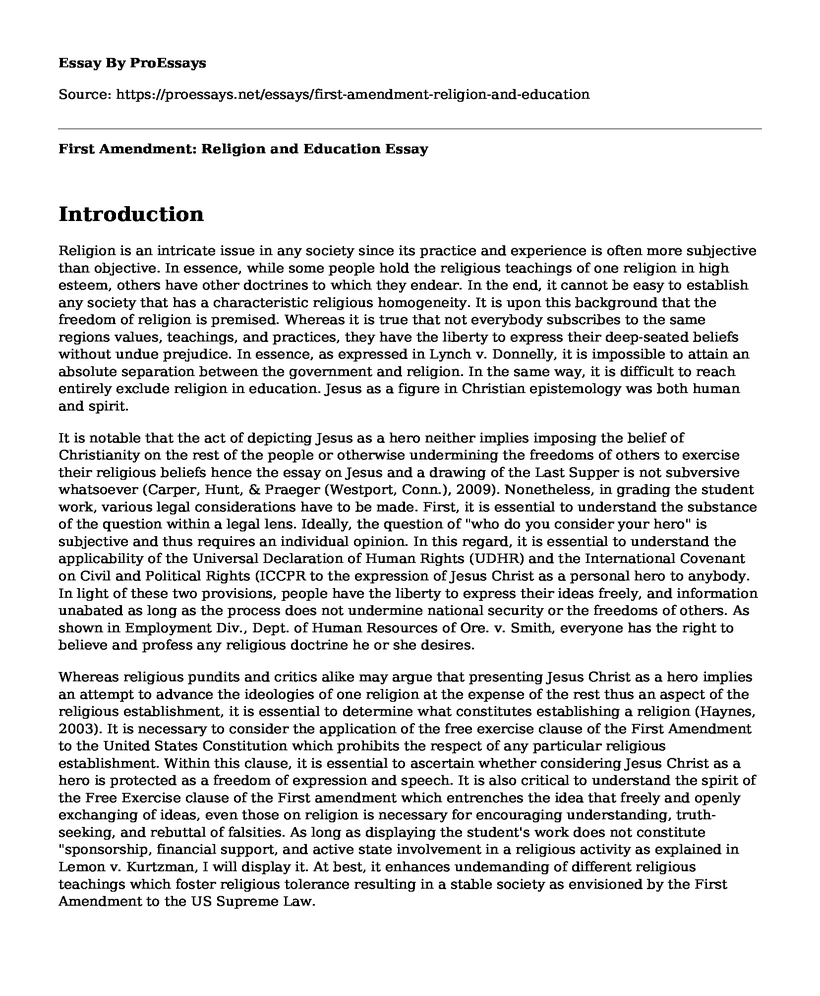Introduction
Religion is an intricate issue in any society since its practice and experience is often more subjective than objective. In essence, while some people hold the religious teachings of one religion in high esteem, others have other doctrines to which they endear. In the end, it cannot be easy to establish any society that has a characteristic religious homogeneity. It is upon this background that the freedom of religion is premised. Whereas it is true that not everybody subscribes to the same regions values, teachings, and practices, they have the liberty to express their deep-seated beliefs without undue prejudice. In essence, as expressed in Lynch v. Donnelly, it is impossible to attain an absolute separation between the government and religion. In the same way, it is difficult to reach entirely exclude religion in education. Jesus as a figure in Christian epistemology was both human and spirit.
It is notable that the act of depicting Jesus as a hero neither implies imposing the belief of Christianity on the rest of the people or otherwise undermining the freedoms of others to exercise their religious beliefs hence the essay on Jesus and a drawing of the Last Supper is not subversive whatsoever (Carper, Hunt, & Praeger (Westport, Conn.), 2009). Nonetheless, in grading the student work, various legal considerations have to be made. First, it is essential to understand the substance of the question within a legal lens. Ideally, the question of "who do you consider your hero" is subjective and thus requires an individual opinion. In this regard, it is essential to understand the applicability of the Universal Declaration of Human Rights (UDHR) and the International Covenant on Civil and Political Rights (ICCPR to the expression of Jesus Christ as a personal hero to anybody. In light of these two provisions, people have the liberty to express their ideas freely, and information unabated as long as the process does not undermine national security or the freedoms of others. As shown in Employment Div., Dept. of Human Resources of Ore. v. Smith, everyone has the right to believe and profess any religious doctrine he or she desires.
Whereas religious pundits and critics alike may argue that presenting Jesus Christ as a hero implies an attempt to advance the ideologies of one religion at the expense of the rest thus an aspect of the religious establishment, it is essential to determine what constitutes establishing a religion (Haynes, 2003). It is necessary to consider the application of the free exercise clause of the First Amendment to the United States Constitution which prohibits the respect of any particular religious establishment. Within this clause, it is essential to ascertain whether considering Jesus Christ as a hero is protected as a freedom of expression and speech. It is also critical to understand the spirit of the Free Exercise clause of the First amendment which entrenches the idea that freely and openly exchanging of ideas, even those on religion is necessary for encouraging understanding, truth-seeking, and rebuttal of falsities. As long as displaying the student's work does not constitute "sponsorship, financial support, and active state involvement in a religious activity as explained in Lemon v. Kurtzman, I will display it. At best, it enhances undemanding of different religious teachings which foster religious tolerance resulting in a stable society as envisioned by the First Amendment to the US Supreme Law.
References
Carper, J. C., Hunt, T. C., & Praeger (Westport, Conn.). (2009). The Praeger handbook of religion and education in the United States. Westport, Conn: Praeger Publishers.
Employment Div., Dept. of Human Resources of Ore. v. Smith, 494 U.S. 872, 110 S. Ct. 1595, 108 L. Ed. 2d 876 (1990).
Haynes, C. C. (2003). The First Amendment in schools: A guide from the First Amendment Center. Alexandria, Va: Association for Supervision and Curriculum Development.
Lemon v. Kurtzman, 403 U.S. 602, 91 S. Ct. 2105, 29 L. Ed. 2d 745 (1971).
Lynch v. Donnelly, 465 U.S. 668, 104 S. Ct. 1355, 79 L. Ed. 2d 604 (1984).
Cite this page
First Amendment: Religion and Education. (2022, Jun 19). Retrieved from https://proessays.net/essays/first-amendment-religion-and-education
If you are the original author of this essay and no longer wish to have it published on the ProEssays website, please click below to request its removal:
- A Study of the Influences of Technology on Children's Abilities in Socialisation During the Ages of 3 To 8
- Why I Want to Be a Paralegal Essay Example
- Problem Affecting University Students in Hong Kong Essay Example
- Essay Sample on Play Therapy: A Research-Based Approach to Helping Children
- Essay Sample on Fostering Empathy in Children: An Essential Skill
- Paper Sample on Lost World: The Native Americans' Reverence for Earth and Life
- Free Report Sample on Committee on Privileges & Elections Report on US Elections & Voting Rights







